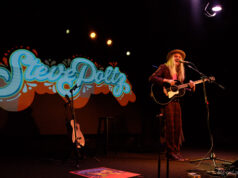Jeffrey Scott performs at the Music Maker Foundation’s showcase at the National Gallery of Art on Feb. 26, 2023. (Photo by Timothy Duffy)
On Sunday afternoon, the National Gallery of Art hosted a series of four concerts sponsored by the Music Maker Foundation: blues guitarists Jeffrey Scott and Gail Caesar, sacred soul band The Dedicated Men of Zion, and blues vocalist Pat “Mother Blues” Cohen.
The concerts, which were free to the public, were well attended; at the first two, held on the mezzanine of the Gallery’s East building on the National Mall, the audience overflowed the available seating, with a number of folks sitting against the walls, and even just on the open floor.
Based in Hillsboro, North Carolina — “right smack dab in the middle of the state” — the Music Maker Foundation has supported senior roots musicians, mostly Black, in the South, for 29 years. Only a very small slice of people who make and play music meet with commercial success; most artists do it because they have a love for the music. The Music Maker Foundation provides about 1,100 grants a year to these musicians to assist them with food, shelter, and medical expenses, and to help them keep their musical traditions alive.
These concerts were presented on Feb. 26 in conjunction with the Gallery’s exhibit, “Called To Create: Black Artists of the American South,” which is on display until March 22.
I once heard singer-songwriter Cory Branan express pride in his Mississippi heritage “because that’s where all the music is from.” Blues, gospel, country — all of those genres began in the South. Rock ‘n’ roll did, too, of course, and has achieved a mainstream cultural cache that has eluded these more rootsy forms, like the country blues played on acoustic guitar by Scott and Caesar. Scott hails from Culpeper, Virginia, in the Piedmont region of the Blue Mountains; he explained that Piedmont blues is a “country blues.” He’s worked a number of different jobs: cattleman, hog farmer, mortician, and long-haul truck driver. He learned the blues from his uncle, John Jackson, who was caretaker of Fairfax’s cemeteries and he has many fond memories of the two of them digging graves together. Tim Duffy, now the executive director of Music Maker, met Jackson when he was 18. In 2012, Duffy met Scott and invited him to participate in the Foundation’s 20th anniversary celebration.
Scott began his 45-minute set with Blind Boy Fuller’s “Key to The Highway.” Introducing “Bootlegger’s Blues,” he explained there are a lot of bootleggers where’s he from. “I had the pleasure of locking some of them up,” he said, “when I was a deputy.” In “Going Down to Georgia on a Hog,” “hog” is slang for the locomotive of a train.” Before the next tune, “Steamboat Whistle Blues,” he shared that his two sons are continuing the family musical traditions; both play guitar.
Watch Jeffrey Scott play “Oreo Cookie Blues” on YouTube:
The set continued with “Come On In,” following by a “spiritual song, a gospel song,” which he said “means a lot to me.” Sometimes, he said, “you have to be on your back to look up.” He shared a harrowing story of being run over a truck, after which he spent three months recovering from the accident in a nursing home. This worked out for the best, because he met his wife, who is a physical therapist.
As Dylan titled one of his late-’90s album, when it comes to this music, there’s a tradition of “love and theft,” of White musicians appropriating songs from Black artists. Arthur “Big Boy” Crudup, Jeffrey told the audience, got paid just $20 for “That’s Alright, Mama.” Carl Perkins, he said, “made a few million dollars” from his recording of it, and then Elvis “made many millions.” Scott ended his set with “Black Cat Blues.”
Gail Ceaser is another Virginian, from Redmond, albeit two decades younger than Scott. Music is a family tradition for her as well. Music Maker recorded her uncle, Pete Wither, and he introduced the foundation to Gail. As a player, her style incorporates both country blues and bluegrass, and some of her song selections translated more urban, Chicago blues to the combination of those styles.
Gail began her set with Elizabeth Cotten’s “Freight Train.” The origins of “Going Down That Road Feeling Bad” have been lost to time; the song has been recorded by a number of artists over the last century. While these first two songs were country blues — the latter has been described as a “white blues” and has been recorded by Appalachian singers — Caesar next covered a Chicago blues song, Jimmy Reed’s “Baby You Don’t Have To Go,” which she said was “one of the first tunes I learned.” Chicago blues, like much “urban blues,” is typically electric rather than acoustic, as it was played here. The Chicago theme continued with Robert Johnson’s “Sweet Home Chicago,” actually a country blues about Chicago, rather than a proper example of Chicago blues. Gail finished with a gospel number, “Where Could I Go But To the Lord?” She spoke about spending time with her uncle in church.
The day’s activities moved to an auditorium for the next performance, by sacred soul” group The Dedicated Men of Zion. The band, eight in number, with four vocalists singing in harmony- — Anthony and Atwan Daniels, Dexter Weaver, and Marcus Sugg, who are all related by blood or marriage — represent a tradition from eastern North Carolina, from the city of Greenville and the neighboring small town of Farmville. (Small joke: This is not the basis for the Facebook game!) The DMZ have garnered praise from critics like Ann Powers of NPR, and they’ve released two albums with Bible & Tire Recording Co., founded by producer Bruce Watson of Fat Possum Records.-
This was a high-energy powerformance, driven by electric instruments, and the Dedicated Men of Zion got the audience worked up and involved. They got the crowd up on their feet, clapping along, made them part of the show. This is true to the music’s roots in religious services, which are not about performance so much as participation.
Even if you’re not Christian — my heritage is Jewish — the enthusiasm and power of this singing is infectious. It’s very real, and very deeply felt, and you don’t have to share the artists’ faith to understand the depth and meaning of what they do.
Watch the Dedicated Men of Zion perform a Tiny Desk Concert (at home) for NPR Music on YouTube:
Speaking of Judaism, I was intrigued that the last artist of the day, Pat “Mother Blues” Cohen bears the name of the Jewish priestly class. I asked her about this; it is her family name. Though there weren’t many — simply because there were not a lot of Jews in America prior to the last century — there were Jews who lived in the South and owned slaves, and their descendants carry those names.
Cohen, like the DMZ, was backed by an electric band that brought a lot of energy and vigour to her performance, which was polished and full of good-natured sass and attitude. Cohen has followed an interesting path through life. Though born in the South, Monroe, North Carolina, specifically, her family moved to New Jersey when she was a child. She began performing while in college, and moved to New Orleans, where she performed 6 nights a week, until she lost her home in Hurricane Katrina. She relocated to East Spencer, North Carolina, and began touring with the Music Maker Blues Review. Tragedy stuck again, as a fire destroyed her house, and Music Maker helped her find a new place to live.
Pat belongs to the distinguished tradition of female blues singers like Billie Holiday, Koko Taylor, and Etta James. She’s blessed with an amazing voice, one she has put to many compassionate uses. As her gigs dried up with Covid, she took to performing alone at nursing homes, bringing the light and joy of music to their residents. The audience was lucky to get to see her play with a full band and show us the full extent of her talents.
Events like this remind me why I love living in this area. We are lucky to have world-class museums and arts events; the music scene here is amazing, too. Whenever I feel put out by the considerable cost of living here, I remember that there are a lot of benefits to be had.
Here are some photos from the Soul & Blues: Music Maker Showcase at the National Gallery of Art on Feb. 26, 2023. All photos by Timothy Duffy.





















